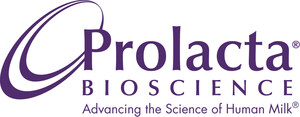Debut Video Shows the Pivotal Role Breast Milk Donors Play in Helping Premature Infants Survive and Thrive With an Exclusive Human Milk Diet
DUARTE, Calif., Nov. 17, 2022 /PRNewswire/ -- Prolacta Bioscience®, the world's leading hospital provider of 100% human milk-based nutritional products for critically ill, premature infants, celebrates Prematurity Awareness Month and World Prematurity Day, Nov. 17, by extending its gratitude to the many devoted individuals – breast milk donors, parents of premature infants, and NICU teams – who play an integral role in providing essential nutrition for medically fragile infants in the neonatal intensive care unit (NICU).
"It takes a village to provide an Exclusive Human Milk Diet (EHMD) to NICU babies – from the hardworking breast milk donors who carefully collect, freeze, and ship their milk, to the families who advocate for their infants, to the NICU teams who care for them day in and day out," said Melinda Elliott, MD, chief medical officer of Prolacta. "We are so thankful for this family of committed people who make it possible for us to improve the lives of these fragile babies. From the bottom of our hearts, we extend our sincere gratitude."
To show the pivotal role Prolacta's dedicated donors play in helping premature infants grow and get healthy, Prolacta is debuting a new video today documenting the first time donor Erin meets Aria, a Prolacta baby, and her mom, Mya. Aria received Prolacta's nutritional products around the time Erin donated. The video tells the story of Aria's premature birth at 27 weeks 1 day and her eventual healthy homecoming after 110 days in the NICU. Prolacta's 100% human milk-based fortifiers were added to Mya's milk to help Aria gain weight and grow.
Erin became a Prolacta donor in 2014. Her own twins were born at 26 weeks and were in the NICU for three months. She quickly realized she was producing more milk than her twins needed. At the suggestion of her twins' NICU nurse, she started researching milk banks. "I came across Prolacta, and I loved the fact that I could ship my donated milk to help babies in critical need," Erin said.
"Breastfeeding and pumping is work! Knowing that another mother was doing the same thing for the sake of donating is amazing. It really touched my heart," said Mya, mother of a NICU baby. Today, Aria is a healthy 1-year-old who's meeting all her developmental marks. "To see her thriving is nothing short of a miracle, and we are so thankful," added Mya.
Prolacta is only able to bring patients like Aria 100% human milk-based nutritional products because of the excess milk from donors throughout the United States. Prolacta offers two milk banks for women to donate their excess breast milk to, Tiny Treasures, where donors are compensated $1.10 per ounce, and Helping Hands, where donors choose to contribute $1.10 per ounce to the Susan G. Komen breast cancer foundation. Thanks to the generosity of Helping Hands breast milk donors, Prolacta has donated over $1.7 million to Susan G. Komen to date.
Through the Tiny Treasures Milk Bank, Prolacta has supported nearly 10,000 donors whose donations have helped provide an EHMD to the most fragile, premature infants in NICUs throughout the world. "Honestly, the compensation in the beginning with the twins enabled me to stay home with them. They were micropreemies, and I could not send them to day care, which meant I couldn't go back to work, so the compensation meant the world to me. I appreciate being a donor for so long. To help those little babies get a better start at life is something that brings so much joy to my life," said breast milk donor Erin.
"One of the ways we show appreciation for our donors is by compensating them ethically for the value of their breast milk while also recognizing the considerable time and effort required to collect and donate it," said Susan Neumann, vice president of milk resourcing for Prolacta. "Our donors make a meaningful impact in saving the lives of premature infants worldwide, and we are so grateful for their contributions and dedication to our mission."
The major difference between cow milk-based and human milk-based products is the composition — notably, the bioactive components that are unique to human milk. These include immunoglobulins, lactoferrin, milk fat globule membrane, and the wide spectrum of prebiotics known as human milk oligosaccharides (HMOs), which are not easily manufactured and thus are greatly decreased or missing from cow milk-based nutritional products.1 Bioactivity is thought to support infants' immunity, development, growth, and long-term health.2
Prolacta's 100% human milk-based nutritional products have the highest bioactivity in the human milk industry.3 Prolacta's nutritional products are vat pasteurized using profiles defined by the U.S. Food and Drug Administration (FDA) to ensure pathogen inactivation and the highest level of safety while retaining as much of the natural bioactivity of the milk as possible.4 Prolacta's vat pasteurized products retain higher bioactivity than products processed using other methods, including retort sterilization and ultra-high-temperature (UHT) processing.3,5,6
Prolacta Bioscience® Inc. is a privately held, global life sciences company dedicated to Advancing the Science of Human Milk® to improve the health of critically ill, premature infants. Prolacta's 100% human milk-based nutritional products have been evaluated in more than 20 clinical studies published in peer-reviewed journals. More than 80,000 premature infants have benefited from Prolacta's nutritional products worldwide to date.7 Established in 1999, Prolacta is the world's leading provider of human milk-based nutritional products for hospital use and is also exploring the therapeutic potential of human milk across a wide spectrum of diseases. Prolacta maintains the industry's strictest quality and safety standards for screening, testing, and processing donor human milk. Operating the world's first pharmaceutical-grade human milk processing facilities, Prolacta uses vat pasteurization and a patented, FDA-reviewed manufacturing process to ensure pathogen inactivation while protecting the nutritional composition and bioactivity of its human milk-based products. Prolacta is a global company with headquarters in Duarte, California, and can be found online at www.prolacta.com, on Twitter, Instagram, Facebook, and LinkedIn.
Media Contact:
Loren Kosmont
[email protected]
310-721-9444
References
1. Ballard O, Morrow AL. Human milk composition: nutrients and bioactive factors. Pediatr Clin North Am. 2013;60(1):49-74. doi:10.1016/j.pcl.2012.10.002
2. Gila-Diaz A, Arribas SM, Algara A, Martín-Cabrejas MA, López de Pablo ÁL, Sáenz de Pipaón M, Ramiro-Cortijo D. A review of bioactive factors in human breastmilk: a focus on prematurity. Nutrients. 2019;11(6):1307. doi:10.3390/nu11061307
3. Liang N, Koh J, Kim BJ, Ozturk G, Barile D, Dallas DC. Structural and functional changes of bioactive proteins in donor human milk treated by vat-pasteurization, retort sterilization, ultra-high-temperature sterilization, freeze-thawing and homogenization. Front. Nutr. 2022.
https://doi.org/10.3389/fnut.2022.926814
4. Data on file.
5. Lima HK, Wagner-Gillespie M, Perrin MT, Fogleman AD. Bacteria and bioactivity in Holder pasteurized and shelf-stable human milk products. Curr Dev Nutr. 2017;1(8):e001438. doi:10.3945/cdn.117.001438
6. Meredith-Dennis L, Xu G, Goonatilleke E, Lebrilla CB, Underwood MA, Smilowitz JT. Composition and variation of macronutrients, immune proteins, and human milk oligosaccharides in human milk from nonprofit and commercial milk banks. J Hum Lact. 2018;34(1):120-129. doi:10.1177/0890334417710635
7. Estimated number of premature infants fed Prolacta's products from January 2007 to December 2021; data on file.
SOURCE Prolacta Bioscience

WANT YOUR COMPANY'S NEWS FEATURED ON PRNEWSWIRE.COM?
Newsrooms &
Influencers
Digital Media
Outlets
Journalists
Opted In






Share this article